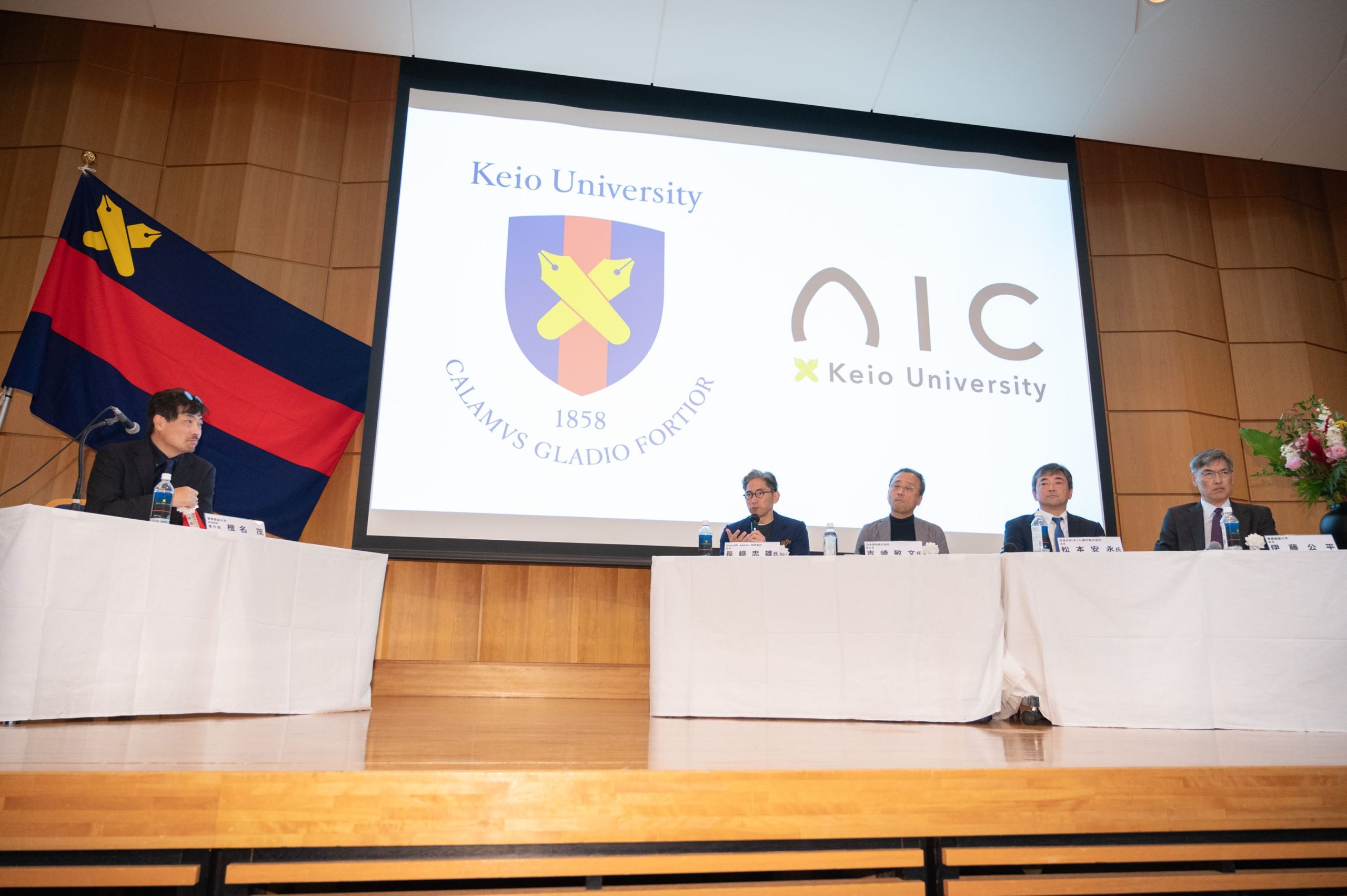
Report
Event
【Event Report】2024 AI Insight Summit
2024.12.22 written by
On December 2, 2024, AIC welcomed the CEO of OpenAI Japan, Tadao Nagasaki, to Mita Campus for the 2024 Insight Summit.
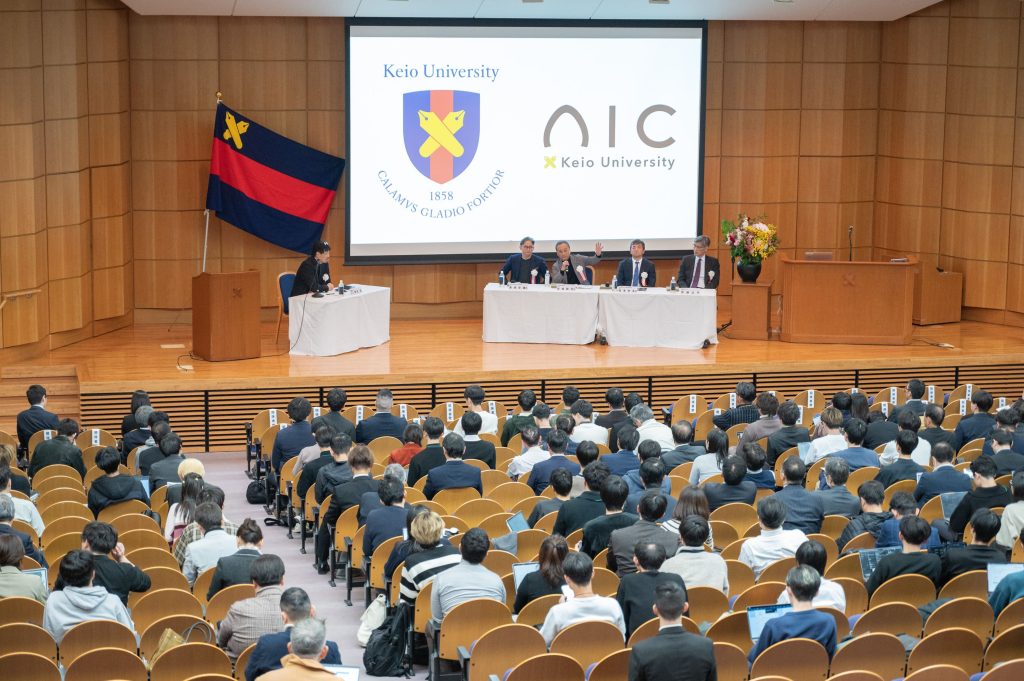
Opening Remarks
The event kicked off with opening remarks by Keio University President Kohei Itoh.
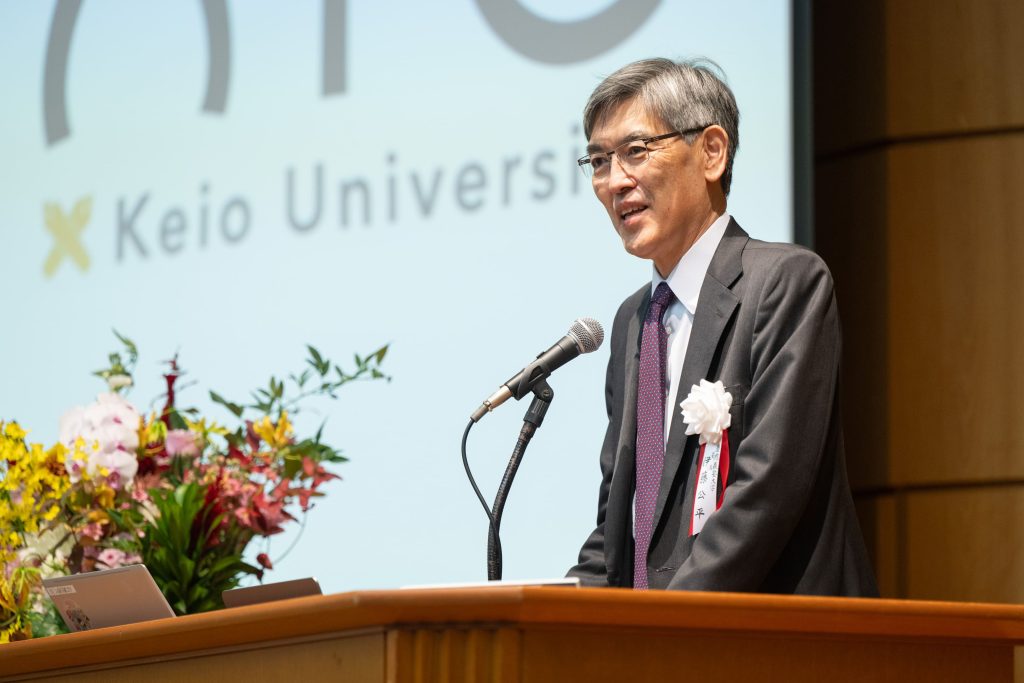
President Itoh referred to the event held on November 20, titled “Dialogue between Keio Students and Leaders—The Future Made Possible by AI,” which featured Microsoft CTO Kevin Scott. He recalled the striking analogy that “AI is like an elevator that can assist us in scaling the mountain of academia.”
President Itoh further remarked that with ChatGPT and other rapid advances in AI, it is now easier than ever before to ascend to the summit of the “mountain of academia.” On the other hand, he pointed out that going forward, it is imperative that we figure out how to apply such AI technologies to our own goals and learning—our own “mountains” as it were.
Keynote Speech by OpenAI Japan CEO Tadao Nagasaki
Following that, OpenAI Japan CEO Tadao Nagasaki took to the stage to deliver his keynote speech.
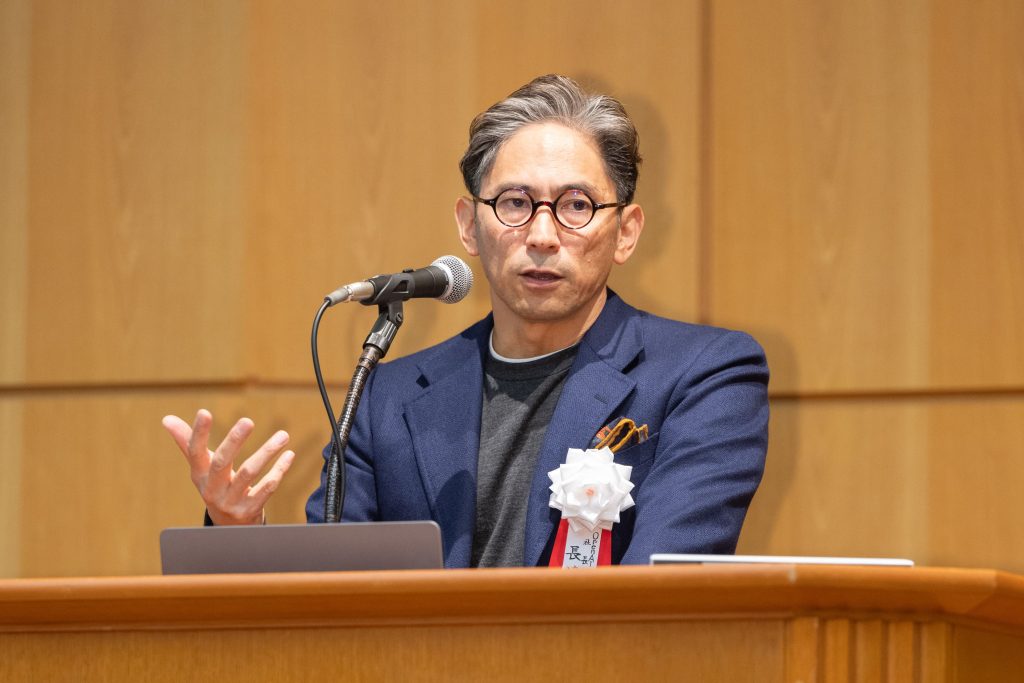
The Vision of OpenAI Japan and its Role in the Japanese Market
CEO Nagasaki first referenced the vision and foundational principle of OpenAI, which is to “create an environment where anyone can use AI, and a society where individuals and corporations can utilize AI to improve business efficiency and resolve issues,” stating that AI will form the foundation for creating a sustainable future.
He continued by introducing OpenAI Japan, the company’s first office in Asia established outside of the English-speaking world. The Tokyo office seeks to leverage OpenAI’s global knowledge and experience to provide AI solutions that serve Japan’s unique needs and address social issues unique to Japan.
R&D Structure and Characteristics at OpenAI
In his speech, CEO Nagasaki gave an overview on the two main R&D teams at OpenAI. One team focuses on developing cutting-edge AI engines while the other, the Applied Team, is in charge of developing applications and tools that are intuitive for the average user. He remarked that OpenAI’s strength lies with these two teams working in unison to simultaneously advance technological innovation and practical application of AI.
He further noted that ChatGPT, which was launched in the fall of 2022, represented a turning point in the expansion of AI usage beyond researchers and developers to individuals and corporations. He added that in becoming a tool that even non-experts can use, ChatGPT has given rise to new ideas and expanded the range of solutions to various issues.
Practical Application and Future Prospects of AI
OpenAI provides solutions tailored for individuals such as personalized learning and support in improving business efficiency. At the same time, it is building custom GPTs that fulfill security requirements for private corporations. CEO Nagasaki also touched on a version geared towards education and targeted at universities, and expressed his hopes for the future where AI could potentially revolutionize the way we learn. He anticipates that this would pave the way for personalized curricula for students, improving operational efficiency and accelerating research progress for faculty members, university staff, and researchers.
He also cited the example of Be My Eyes, an application developed in Denmark for visually-impaired and low-vision individuals. He then discussed the pharmaceutical company Moderna, which leveraged AI to boost operational efficiency, illustrating how AI can be used to solve real-world issues.
The Evolution of ChatGPT and the Potential of OpenAI o1, a New Large Language Model
At this point in the event, participants were shown new search functions and advanced voice features recently added to ChatGPT through live demonstrations. These new features enable more natural interactions and efficient information gathering, thereby facilitating the further integration of AI into everyday life.
In addition, the new model, o1, is the first AI that possesses logical thinking ability and the capacity for trial-and-error. Therefore, it holds great potential for resolving issues in specific fields such as mathematics and chemistry. This model is capable of solving problems that humans have yet to unravel and could bring about a paradigm shift in AI research.
The Proliferation of AI and Outlook for the Future
According to CEO Nagasaki, currently about 200 million people worldwide use ChatGPT every week, and this number is expected to grow as more people gradually become familiar and acquainted with its features. He anticipates that as AI becomes more deeply ingrained in our daily lives, we can expect to embark on an era in which people will be able to achieve their goals in more creative and efficient ways.
Panel Discussion
The keynote speech was followed by a panel discussion. The four panelists were OpenAI Japan CEO Tadao Nagasaki, NEC Corporate Senior Executive Vice President Toshifumi Yoshizaki, SBI Sumishin Net Bank Chairman Yasunaga Matsumoto, and Keio University President Kohei Itoh, with Visiting Professor Shigeru Shiina at the Faculty of Science and Technology serving as facilitator for the discussion.
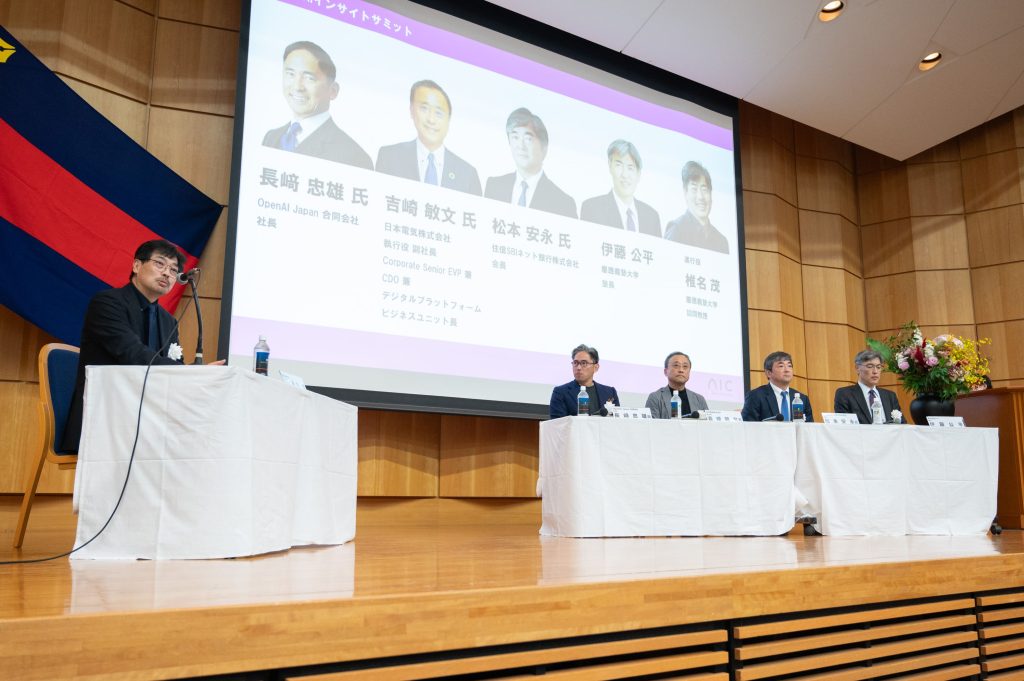
The panelists discussed the possibilities and challenges associated with AI, responding to questions from the audience, many of whom were students. They delved deep into education, ethics, and regulations as they relate to AI.
Corporate Initiatives and the Evolution of AI
At the start of the discussion, each panelist gave an overview of their organization and specific examples of their AI initiatives.
NEC Vice President Yoshizaki spoke on their various projects in the field of AI, such as building a national ID system in South Africa and Japan’s first Large Language Model (LLM) using the company’s technological capabilities in IT infrastructure. He stated that it will be paramount for the company to go beyond improving business efficiency to autonomous business operation by AI in the future.
SBI Sumishin Chairman Matsumoto introduced an example of efficient business operation with a small number of employees, where AI was used to automate the process of mortgage loan screening. He also talked about the challenges and possibilities associated with building a new business model using AI.
OpenAI Japan CEO Nagasaki explained that the Research and Applied Teams have been collaborating to expand the possibilities of AI. He expects that AI will bring out the creativity in people and contribute to improving productivity.
Education and the Future of AI
President Itoh, a pioneer in AI education, introduced the AI and Advanced Programming Consortium (AIC), now entering its sixth year of operation. AIC adopts a system in which students possessing a certain level of knowledge about AI impart valuable insights to other students interested in the subject. In addition, he emphasized that AIC also has corporate sponsors to ensure consistent funding for its activities and programs. These corporations also enable hands-on learning by providing real data from their company databases.
President Itoh also advocated the need to strike a balance between digital and human interaction even as we recognize the importance of utilizing AI as a tool to enhance competencies in each field.
Ethics and Regulations regarding AI
Questions from participants prompted in-depth discussions on risks and ethical issues arising from AI, as well as regulations for this technology.
OpenAI Japan CEO Nagasaki introduced his company’s initiatives to ensure safety by conducting thorough verification, such as jailbreak tests to prevent the spread of dangerous information. He stated that OpenAI aims to create an environment in which society can become accustomed to AI by placing security as a top priority and revealing new technology in incremental stages.
Meanwhile, NEC Vice President Yoshizaki pointed out that the current state of technological evolution is surpassing regulations and underscored the importance of ethical perspectives among technical experts. He further asserted that it is essential for society as a whole to discuss human rights issues, among other problems, in this age of AI, and to involve scholars in the humanities in multifaceted discussions.
President Itoh mentioned the risks of cyberattacks conducted by AI and stressed the need to create the most advanced AI possible.
Networking Session
A networking session was held following the event, where students and professionals alike across a range of disciplines and industries engaged and interacted with each other through lively discussions.
Participants leveraged the opportunity to discuss the issues raised during the event in greater depth and build new personal networks, making the event an incredible success.
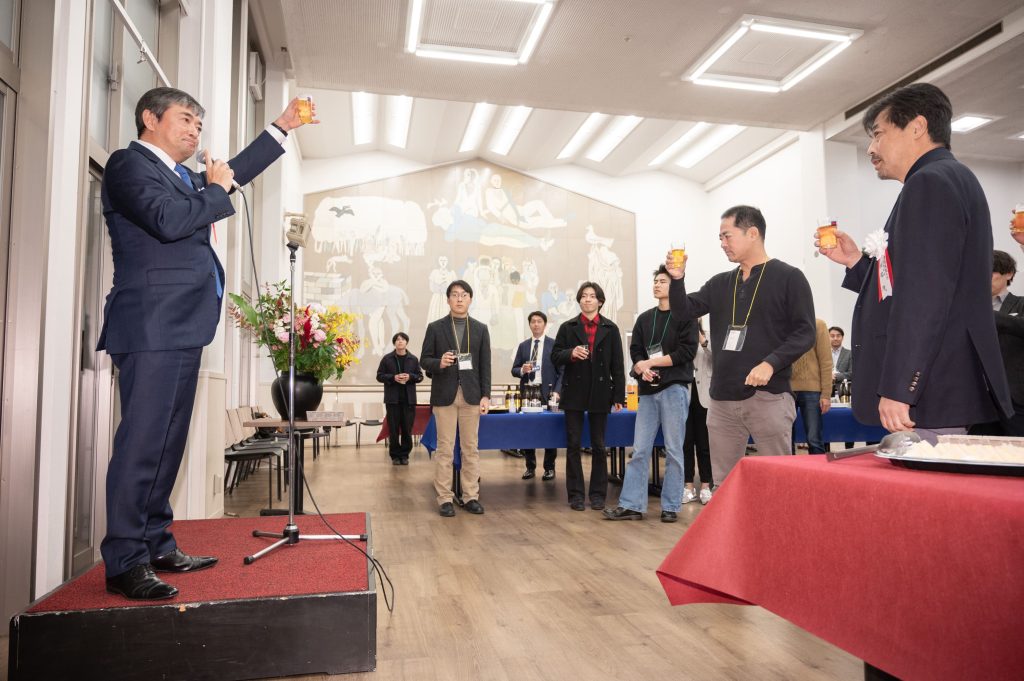
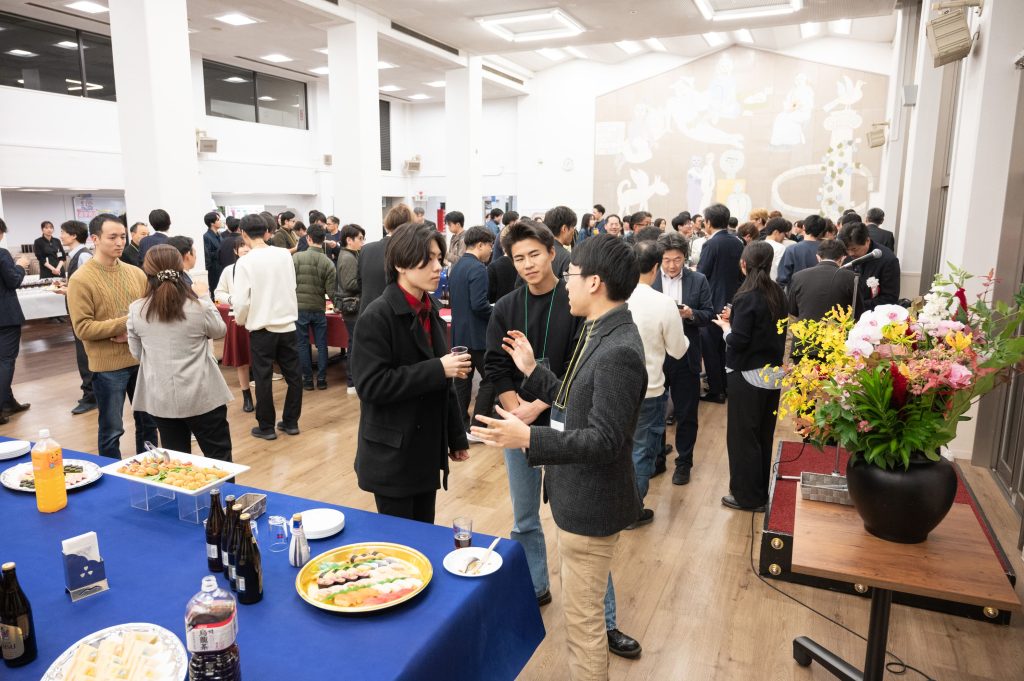
(Photo by Aki Takematsu)

